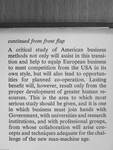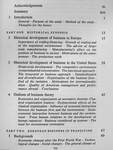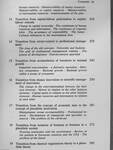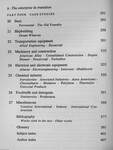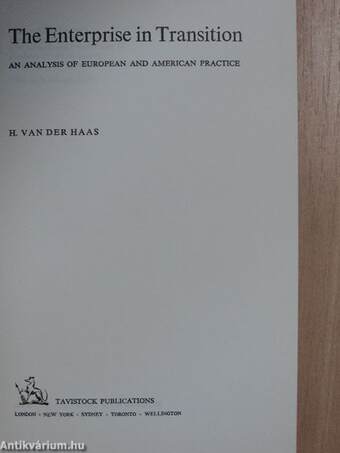1.062.486
kiadvánnyal nyújtjuk Magyarország legnagyobb antikvár könyv-kínálatát

VISSZA
A TETEJÉRE
JAVASLATOKÉszre-
vételek
The Enterprise in Transition
An Analysis of European and American Practice
| Kiadó: | Tavistock Publications |
|---|---|
| Kiadás helye: | London |
| Kiadás éve: | |
| Kötés típusa: | Vászon |
| Oldalszám: | 408 oldal |
| Sorozatcím: | |
| Kötetszám: | |
| Nyelv: | Angol |
| Méret: | 22 cm x 14 cm |
| ISBN: | |
naponta értesítjük a beérkező friss
kiadványokról
naponta értesítjük a beérkező friss
kiadványokról
Fülszöveg
European industry in general is falling
behind in the race to adapt effectively to
a rapidly changing economic, political, and
social environment. Indeed, business in
Europe has for long lacked the environment
orientation so necessary to meet adequately
the challenge of the Common Market and
the competition of international American
investment. The urgent need now, therefore,
is to speed up the processes of transition
and to steer them in the appropriate direc-
tion.
Dr. van der Haas, from his vantage point
in Management Services of the Shell Group
at The Hague, uncovers some of the roots
of success and failure in adaptation, illus-
trating his theme from the case-papers of
his own research study of business practice
and change in a variety of European and
American enterprises in six countries. He
indicates something of the scope of the
thinking and planning necessary to meet
the changed, and ever-changing, conditions.
He points out that European business... Tovább
Fülszöveg
European industry in general is falling
behind in the race to adapt effectively to
a rapidly changing economic, political, and
social environment. Indeed, business in
Europe has for long lacked the environment
orientation so necessary to meet adequately
the challenge of the Common Market and
the competition of international American
investment. The urgent need now, therefore,
is to speed up the processes of transition
and to steer them in the appropriate direc-
tion.
Dr. van der Haas, from his vantage point
in Management Services of the Shell Group
at The Hague, uncovers some of the roots
of success and failure in adaptation, illus-
trating his theme from the case-papers of
his own research study of business practice
and change in a variety of European and
American enterprises in six countries. He
indicates something of the scope of the
thinking and planning necessary to meet
the changed, and ever-changing, conditions.
He points out that European business grew
up in a negotiated environment of estab-
lished trading activities, in the spirit of the
'production myth', and in a situation of
labour surplus. Attitudes towards business
activity and the use of resources were dic-
tated by traditional values and normative
theory, which must now be replaced by
functional values and an inductive app-
roach. There must be in business enterprises
a reappraisal of the environment as a com-
plex of dynamic socio-economic and politi-
cal systems, from which arise the resources
entrusted to industry—funds, capital assets,
human beings, and information. In a pro-
cess of rational growth, large as well as
small enterprises must develop in accord-
ance with their own masterplan, designed
to achieve the widest application of distinc-
tive competencies to existing and newly
created market opportunities, the fullest
development of resources, and the long-
range competitive optimization of profits.
continued on back flap
continued from front flap
A critical study of American business
methods not only will assist in this transi-
tion and help to equip European business
to meet competition from the USA in its
own style, but will also lead to opportun-
ities for planned co-operation. Lasting
benefit will, however, result only from the
proper development of greater human re-
sources. This is the area to which most
serious study should be given, and it is one
in which business must join hands with
Government, with universities and research
institutions, and with professional groups,
from whose collaboration will arise con-
cepts and techniques adequate for the chal-
lenge of the new man-machine age. Vissza
Témakörök
- Közgazdaságtan > Menedzserképzés, marketing
- Közgazdaságtan > Számvitel, elemzés
- Közgazdaságtan > Közgazdasági elméletek > Egyéb
- Közgazdaságtan > Gazdaságtörténet > Tanulmányok
- Idegennyelv > Idegennyelvű könyvek > Angol > Közgazdaságtan > Menedzserképzés, marketing
- Idegennyelv > Idegennyelvű könyvek > Angol > Közgazdaságtan > Számvitel, elemzés
- Idegennyelv > Idegennyelvű könyvek > Angol > Közgazdaságtan > Gazdaságtörténet > Tanulmányok
- Közgazdaságtan > Vállalkozások > Általában
- Idegennyelv > Idegennyelvű könyvek > Angol > Közgazdaságtan > Közgazdasági elméletek > Egyéb
- Idegennyelv > Idegennyelvű könyvek > Angol > Közgazdaságtan > Vállalkozások > Általában






